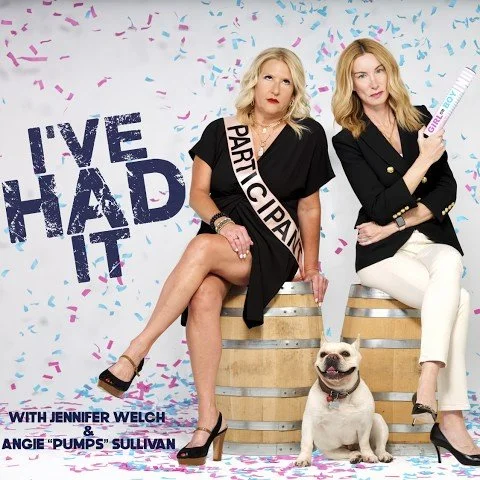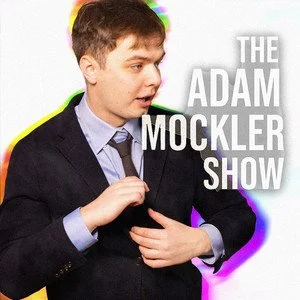The Progressive Podcast Revolution: How "I've Had It" and Adam Mockler Are Disrupting Conservative Media Dominance
The political podcast landscape is experiencing a seismic shift as progressive voices challenge the conservative stronghold on growth and engagement
For years, the political podcast growth charts have been dominated by a familiar roster of conservative voices. Names like Benny Johnson, PBD Podcast, Candace Owens, and Charlie Kirk have consistently topped subscriber counts and engagement metrics, seemingly owning the political commentary space on YouTube and beyond.
But something remarkable is happening in 2025. Two progressive voices are not just growing—they're exploding. "I've Had It Podcast" has reached 1.11 million subscribers with a staggering 14.16% growth rate, while Adam Mockler has built an audience of 1.51 million subscribers with solid 5.71% growth. More importantly, Xcelcast data predictions are projecting "I've Had It" will hit 5 million subscribers by 2027, with Mockler tracking toward 3 million in the same time period.
This isn't just about numbers. It's about a fundamental shift in how Americans consume political content and what voices they're choosing to amplify.
The Market Gap That Conservative Media Created
The dominance of conservative podcasts inadvertently created a massive underserved audience. While right-wing content creators perfected their formulas and built massive followings, progressive and moderate voices struggled to find their footing in a landscape that seemed to reward outrage and polarization over nuanced discussion.
Conservative political podcasts have reached what media analysts call "audience fragmentation"—there are now so many similar voices competing for the same demographic that growth rates have plateaued. The audience that wants to hear from Benny Johnson has largely already found him. The same applies to Charlie Kirk, Candace Owens, and others in their ecosystem.
Meanwhile, millions of Americans hungry for different perspectives, authentic voices, and substantive political discussion have been searching for content that speaks to them. Enter "I've Had It Podcast" and Adam Mockler.
Decoding the "I've Had It" Phenomenon
Jennifer Welch and Angie "Pumps" Sullivan didn't set out to become political powerhouses. The Oklahoma-based duo started as lifestyle content creators, but their evolution into sharp political commentators has struck a chord with audiences craving authenticity over polish.
Their entire premise—being completely "fed up" with political nonsense—taps into widespread voter exhaustion that transcends party lines. Unlike traditional pundits who maintain professional composure, Welch and Sullivan give voice to the exasperation millions feel. As progressive voices from a red state, they offer perspectives often missing from coastal-dominated liberal media, understanding conservative communities from the inside while maintaining progressive values.
Their format feels like eavesdropping on friends venting over coffee rather than consuming produced political content. This intimacy creates a deeper audience connection and loyalty than typical pundit shows. "I've Had It" excels at creating shareable moments—pithy observations, passionate rants, or hilarious takedowns that explode across TikTok, Twitter, and Instagram, driving new viewers back to their long-form content.
The Adam Mockler Digital Strategy
While "I've Had It" represents authentic frustration, Adam Mockler embodies the new generation of digitally native political commentators. His approach demonstrates how understanding algorithms, audience behavior, and platform dynamics can accelerate growth in ways traditional media training never taught.
Mockler has built his brand on immediate, substantive responses to political developments. When news breaks, his audience knows they can count on him for quick, well-researched analysis that goes beyond surface-level reactions. Unlike talking-head formats, Mockler incorporates graphics, charts, social media screenshots, and multimedia elements that make complex political topics accessible and engaging.
Rather than broadcasting to passive audiences, Mockler actively engages with viewers, incorporates their questions and comments, and creates content that feels collaborative rather than top-down. His cross-platform strategy leverages TikTok for discovery, Twitter for real-time engagement, Instagram for visual content, and YouTube for deep-dive analysis—each platform feeding the others.
Cultural Timing and Perfect Conditions
Several cultural and political factors have created perfect conditions for these voices to flourish. Post-Trump exhaustion has left many Americans, regardless of political affiliation, tired of constant outrage and polarization. "I've Had It" and Mockler offer engagement without exhaustion.
Younger audiences prefer personality-driven content over institutional media, wanting to connect with real people rather than corporate brands or talking heads reading from teleprompters. Social media algorithms have democratized media distribution, allowing quality content from unknown creators to reach millions without traditional media gatekeepers.
Despite fatigue with polarization, political engagement remains high. Audiences want political content, but they're increasingly selective about sources that provide both entertainment and substance.
Competitive Landscape and Strategic Challenges
Both creators face significant challenges ahead. Established conservative media won't ignore this progressive surge—expect format copying, counter-programming, and attempts to co-opt successful strategies. However, authenticity can't be easily replicated.
Traditional liberal media outlets like MSNBC and CNN are expanding their podcast offerings with resources individual creators can't match. Still, they often lack the authenticity and agility that drive new media success. As a result, with the next generation of audiences, they are seeing through the old guard media and opting for these new stars.
Algorithm dependency presents risks, as both creators rely heavily on platform algorithms for discovery. Changes to YouTube, TikTok, or other platforms could significantly impact growth, making diversification across platforms and direct audience relationships crucial hedges.
Strategic opportunities include international expansion, as political polarization isn't unique to America. The 2026 midterms and 2028 presidential election will create massive content opportunities for positioning as go-to progressive sources. Growing influence opens doors to political organizing, fundraising, and activism, providing new revenue streams and deeper audience engagement.
Broader Implications for Political Media
The success of "I've Had It Podcast" and Adam Mockler signals several important trends reshaping political communication. Traditional media gatekeepers no longer control who shapes political conversation—anyone with authentic voice and strategic understanding can build massive audiences.
Audiences increasingly trust individual creators over media brands, empowering authentic voices while challenging institutional credibility. Social media algorithms now determine what political content reaches audiences more than editorial decisions by news directors or producers. Most importantly, successful political content creates communities, not just audiences, with sustainable growth coming from fostering genuine connections and engagement.
The Revolution's Future
The rise of these voices represents a fundamental shift in American political media consumption—from passive consumption of institutional content to active engagement with authentic voices. Their success challenges assumptions that conservative voices inherently perform better in digital media, demonstrating that audiences crave authentic, substantive content regardless of political orientation.
For aspiring political content creators, their trajectories offer crucial lessons: authenticity trumps production value, consistency drives growth, community building ensures sustainability, and understanding platform dynamics matters more than traditional media training.
As we head toward future election cycles, voices like "I've Had It Podcast" and Adam Mockler are positioned to play increasingly important roles in shaping political discourse. Their continued growth depends on maintaining authentic audience connections while evolving to meet the changing needs of engaged, politically active viewerships.
The conservative podcast dominance that has defined political media for the past decade faces its first serious challenge. The question isn't whether progressive voices can compete—it's how far this revolution will go in reshaping American political conversation.




